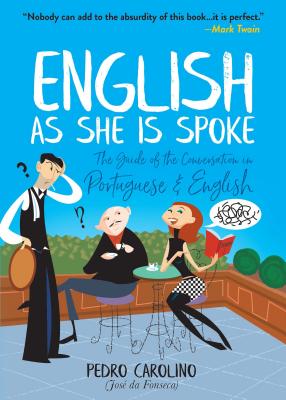Originally conceived as a Portuguese-English phrase book, this literary curiosity was written by an author who, remarkably, spoke no English. With the help of a pair of dictionaries, Pedro Carolino translated a series of expressions from his native Portuguese into French and from French into English. The result is a volume of unintentional hilarity, praised by Mark Twain in his appreciative Introduction for its "miraculous stupidities."
Imagine the Portuguese traveler, with this book in hand, offering grooming tips, "Dress your hairs," making polite dinner conversation, "Like you the soup?" and inviting an acquaintance to take a walk, "Let us go to respire the air." The collection is organized into sections of familiar phrases, familiar dialogues, and familiar letters — which might not strike the native English speaker as particularly familiar, concluding with a selection of humorous anecdotes.
As Twain observed, "In this world of uncertainties, there is, at any rate, one thing which may be pretty confidently set down as a certainty: and that is, that this celebrated little phrase-book will never die while the English language lasts. Its delicious unconscious ridiculousness, and its enchanting naïvete are as supreme and unapproachable, in their way, as are Shakespeare’s sublimities."
Imagine the Portuguese traveler, with this book in hand, offering grooming tips, "Dress your hairs," making polite dinner conversation, "Like you the soup?" and inviting an acquaintance to take a walk, "Let us go to respire the air." The collection is organized into sections of familiar phrases, familiar dialogues, and familiar letters — which might not strike the native English speaker as particularly familiar, concluding with a selection of humorous anecdotes.
As Twain observed, "In this world of uncertainties, there is, at any rate, one thing which may be pretty confidently set down as a certainty: and that is, that this celebrated little phrase-book will never die while the English language lasts. Its delicious unconscious ridiculousness, and its enchanting naïvete are as supreme and unapproachable, in their way, as are Shakespeare’s sublimities."












